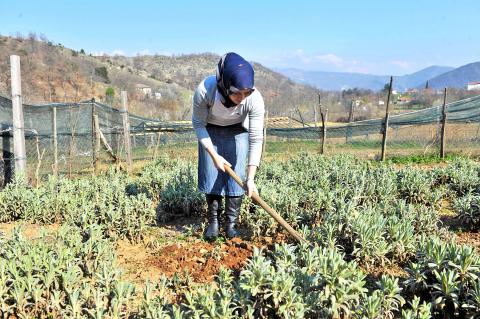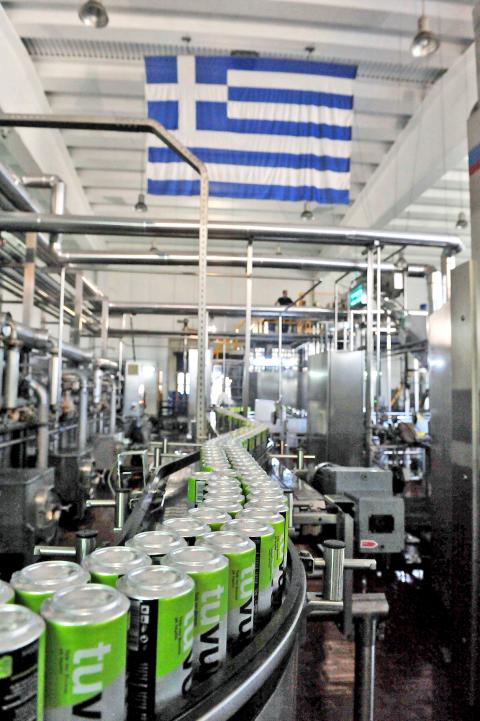Christos Mousafidis, a police officer on the Greek-Albanian border, mainly deals with drug trafficking and illegal immigration. However, this year, he is grappling with a different kind of crime: herb smuggling.
“Villagers alerted us to it,” he said. “Something was going on.”
Climbing for about an hour and a half up to an altitude of about 1,300m, “we discovered a camp in the middle of the mountains and more than a dozen Albanian pickers at work,” Mousafidis said.

Photo: AFP
The makeshift camp of nylon and plastic tents had several days’ worth of provisions.
Mules stood ready to transport the harvest — a staggering 4.5 tonnes of a type of sage —- to market along mountain paths to neighboring Albania.
In August, some less discreet pickers were arrested in the center of Tripoli, a city in the southern Peloponnese, with a truck load of 200kg of wild oregano and “mountain tea” — a very popular infusion in Greece.

Photo: AFP
Though pickers are well aware of the profits to be had from wild Greek plants, the boon has been largely overlooked by the legitimate agricultural sector.
“We have a remarkable biodiversity. Of 7,500 plant species [in Greece], 20 percent are aromatic and pharmaceutical herbs, including dozens of endemic species, but they are not grown very much,” said Eleni Maloupa, a researcher at the Greek agricultural organization DEMETRA.
Greek exports are well behind the European leaders in the sector — Germany, France, Bulgaria, Italy and Poland.
ILLEGAL PICKERS
However, the demand is there. Illegal pickers were paid 20 euro cents (US$0.24) a kilo for herbs harvested this year on the border with Albania, which were sold on for 4 euros a kilo by a middleman in Italy, Mousafidis said.
Whether the end use was culinary or pharmaceutical has not been determined, but the trade was brisk enough that another group was caught in the act at the same place a few weeks later.
The clandestine trade “hurts the flora because the cutting is done without precautions,” forestry official Soulatana Giannakoupolo said.
Maloupa, who runs a botanical garden in northern Greece that specializes in aromatic herbs, also lamented the uncontrolled sale of the herbs.
Kostas Economakis, an expert on mountain teas who formerly worked at the National Institute of Agronomics Research, said: “It’s so much lost profit because these herbs are sold for less when they are not certified.”
At the market in northern Salonika, half of the plants sold in sachets were not cultivated, but picked wild on the mountainside, Maloupa said.
However, the tide is turning. Last year Greek growers set up an association while the government launched a “national catalogue” serving as a scientific reference on the plants.
YOUNG OWNERS
“More and more young people or entrepreneurs are turning towards ... aromatic and pharmaceutical plants,” Maloupa said.
Since 2012, Greek mountain tea has been available in ready-to-drink form with the brand name “Tuvunu” and sold in San Francisco, New York and Paris.
Developed in northeastern Greece between Xanthi and Komotini, Tuvunu is “a mixture of 17 kinds of mountain tea, honey, lemon and nothing else,” owner Demetri Chriss said.
To ensure quality, the business persuaded farmers in the region to alternate the crop with the tobacco they grow.
“Now we have agreements with 300 farmers all over Greece. And we turn down proposals from those who want to send us wild herbs picked in the mountains,” he said.

In Italy’s storied gold-making hubs, jewelers are reworking their designs to trim gold content as they race to blunt the effect of record prices and appeal to shoppers watching their budgets. Gold prices hit a record high on Thursday, surging near US$5,600 an ounce, more than double a year ago as geopolitical concerns and jitters over trade pushed investors toward the safe-haven asset. The rally is putting undue pressure on small artisans as they face mounting demands from customers, including international brands, to produce cheaper items, from signature pieces to wedding rings, according to interviews with four independent jewelers in Italy’s main

Japanese Prime Minister Sanae Takaichi has talked up the benefits of a weaker yen in a campaign speech, adopting a tone at odds with her finance ministry, which has refused to rule out any options to counter excessive foreign exchange volatility. Takaichi later softened her stance, saying she did not have a preference for the yen’s direction. “People say the weak yen is bad right now, but for export industries, it’s a major opportunity,” Takaichi said on Saturday at a rally for Liberal Democratic Party candidate Daishiro Yamagiwa in Kanagawa Prefecture ahead of a snap election on Sunday. “Whether it’s selling food or

CONCERNS: Tech companies investing in AI businesses that purchase their products have raised questions among investors that they are artificially propping up demand Nvidia Corp chief executive officer Jensen Huang (黃仁勳) on Saturday said that the company would be participating in OpenAI’s latest funding round, describing it as potentially “the largest investment we’ve ever made.” “We will invest a great deal of money,” Huang told reporters while visiting Taipei. “I believe in OpenAI. The work that they do is incredible. They’re one of the most consequential companies of our time.” Huang did not say exactly how much Nvidia might contribute, but described the investment as “huge.” “Let Sam announce how much he’s going to raise — it’s for him to decide,” Huang said, referring to OpenAI

The global server market is expected to grow 12.8 percent annually this year, with artificial intelligence (AI) servers projected to account for 16.5 percent, driven by continued investment in AI infrastructure by major cloud service providers (CSPs), market researcher TrendForce Corp (集邦科技) said yesterday. Global AI server shipments this year are expected to increase 28 percent year-on-year to more than 2.7 million units, driven by sustained demand from CSPs and government sovereign cloud projects, TrendForce analyst Frank Kung (龔明德) told the Taipei Times. Demand for GPU-based AI servers, including Nvidia Corp’s GB and Vera Rubin rack systems, is expected to remain high,